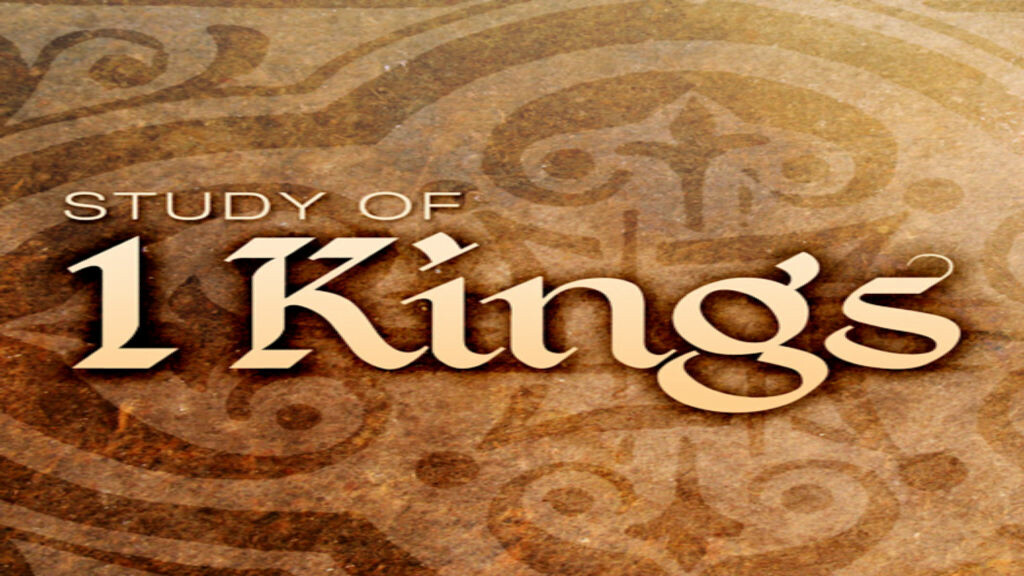1 Kings Bible Study | Chapter 3 | Mike Prah

Jun 23, 2021 | by Mike Prah
THE REVELATION TO KING SOLOMON
1 Kings 3:2-28
Mike Prah
Introduction
The Lord appears to Solomon in a dream and offers him anything he wants. Solomon chooses wisdom and manifests it in settling a complex dispute.
A. THE DETAILS OF THE REVELATION (I Kings 3:5-15)
1. The Assurance (3:5)
- The Lord promises to give Solomon anything he asks for.
- The offer God made to Solomon was as much a test of character as it was a willingness to do for him what he wished. It served to demonstrate where Solomon's priorities lay.
2. The Answer (3:6-9)
- Solomon asks for wisdom that he might govern justly.
"For wisdom is far more valuable than rubies. Nothing you desire can compare with it. I, wisdom, live together with good judgment. I know where to discover knowledge and discernment." Proverbs 8:11-12 (NLT)
- Solomon's response was an expression of gratitude for God's kindness in placing him (David's son) on the throne. His emotion is one of overflowing appreciation for the grace of God (v. 6) and thankfulness for God's faithfulness in respect to the Abrahamic Covenant( i.e., "too numerous to count," cf. Genesis 13:16)
3. The Approval (1 King 3:10-15)
- God is pleased with Solomon's choice and promises to give him wisdom plus riches and honor!
- Solomon bypassed most common requests (prosperity, long life, and victory over enemies). He seeks the more essential thing, and as a result, God promises to give him wisdom "so that there will never have been anyone like you, nor will there ever be" (3:12)
- In addition, God grants him what he had not requested – wealth and honor unequaled in his lifetime (3:13)
- Solomon desired to be a wise and just King. God gave him that, but He also went beyond Solomon's request and gave him fame and a vast extent of insight and learning (See 1 Kings 4:29-34 & 10:1-25)
4. The Condition (I Kings 3:14)
- God's blessing is not automatic. It would depend on Solomon's walk before God. God's faithfulness to the Davidic covenant remained fixed, but if Solomon wished to enjoy God's fullest blessing, he would have to walk in accordance to God's will
5. Solomon's Response: Thanksgiving to God's Goodness(1 King 3:15)
"Then Solomon awoke—and he realized it had been a dream. He returned to Jerusalem, stood before the ark of the Lord's covenant and sacrificed burnt offerings and fellowship offerings. Then he gave a feast for all his court." 1 Kings 3:15 (NIV)
B. THE DEMONSTRATION OF THE REVELATION (3:16-28)
Soon after Solomon is granted wisdom, he displays his ability to judge wisely by settling a difficult dispute
1. The Problem (3:16-22)
Two prostitutes gave birth to sons, but one of the babies dies. One mother claims that the other mother switched babies and gave her the dead child.
2. The Proposal (3:23-25)
Solomon proposes to cut the baby in two, giving half to each other mother
3. The Protest (3:26)
One mother agrees, but the other cries out in protest and is willing to give up the infant that he might live.
4. The Pronouncement (3:27-28)
Solomon awards the baby to the woman who protested, concluding that she is the real birth mother. This gave clear evidence to an unusual degree of God-given ability to rule with great discernment.
1 Kings 3:5-28 (New International Version)
5 At Gibeon, the Lord appeared to Solomon during the night in a dream, and God said, "Ask for whatever you want me to give you."
6 Solomon answered, "You have shown great kindness to your servant, my father David, because he was faithful to you and righteous and upright in heart. You have continued this great kindness to him and have given him a son to sit on his throne this very day.
7 "Now, Lord my God, you have made your servant king in place of my father David. But I am only a little child and do not know how to carry out my duties. 8 Your servant is here among the people you have chosen, a great people, too numerous to count or number. 9 So give your servant a discerning heart to govern your people and to distinguish between right and wrong. For who is able to govern this great people of yours?"
10 The Lord was pleased that Solomon had asked for this. 11 So God said to him, "Since you have asked for this and not for long life or wealth for yourself, nor have asked for the death of your enemies but for discernment in administering justice, 12 I will do what you have asked. I will give you a wise and discerning heart, so that there will never have been anyone like you, nor will there ever be. 13 Moreover, I will give you what you have not asked for—both wealth and honor—so that in your lifetime you will have no equal among kings. 14 And if you walk in obedience to me and keep my decrees and commands as David your father did, I will give you a long life." 15 Then Solomon awoke—and he realized it had been a dream. He returned to Jerusalem, stood before the ark of the Lord's covenant and sacrificed burnt offerings and fellowship offerings. Then he gave a feast for all his court.
16 Now two prostitutes came to the king and stood before him. 17 One of them said, "Pardon me, my Lord. This woman and I live in the same house, and I had a baby while she was there with me. 18 The third day after my child was born, this woman also had a baby. We were alone; there was no one in the house but the two of us.
19 "During the night this woman's son died because she lay on him. 20 So she got up in the middle of the night and took my son from my side while I your servant was asleep. She put him by her breast and put her dead son by my breast. 21 The next morning, I got up to nurse my son—and he was dead! But when I looked at him closely in the morning light, I saw that it wasn't the son I had borne."
22 The other woman said, "No! The living one is my son; the dead one is yours." But the first one insisted, "No! The dead one is yours; the living one is mine." And so they argued before the king. 23 The king said, "This one says, 'My son is alive and your son is dead,' while that one says, 'No! Your son is dead and mine is alive.'"
24 Then the king said, "Bring me a sword." So they brought a sword for the king. 25 He then gave an order: "Cut the living child in two and give half to one and half to the other." 26 The woman whose son was alive was deeply moved out of love for her son and said to the king, "Please, my Lord, give her the living baby! Don't kill him!"
But the other said, "Neither I nor you shall have him. Cut him in two!" 27 Then the king gave his ruling: "Give the living baby to the first woman. Do not kill him; she is his mother." 28 When all Israel heard the verdict the king had given, they held the king in awe, because they saw that he had Wisdom from God to administer justice.
DIGGING DEEPER
SECTION 1: PERSONALIZING THE MESSAGE
(a). What insight from the message left the biggest impression on you? Why?
(b). What did you hear that encouraged or reassured you?
(c). What did you hear that challenged or convicted you?
(d). How did the message increase your appreciation for God the Father, Jesus Christ, or the Holy Spirit?
(e). From your personal experience, how can you illustrate a point from the message?
(f). Who can share the positive results of heeding the message or the painful consequences of disregarding its truth?
SECTION 2: APPLICATION OF THE MESSAGE
(a). What personal application of the message has the Lord shown you? How do you feel about following through with it?
(b). How should the message we heard affect or change our prayers?
(c). If we diligently apply the message, what effect would it have on personal lives and our daily walk with Christ?
(d). What would you say to share this helpful information to benefit someone who did not hear this message?
